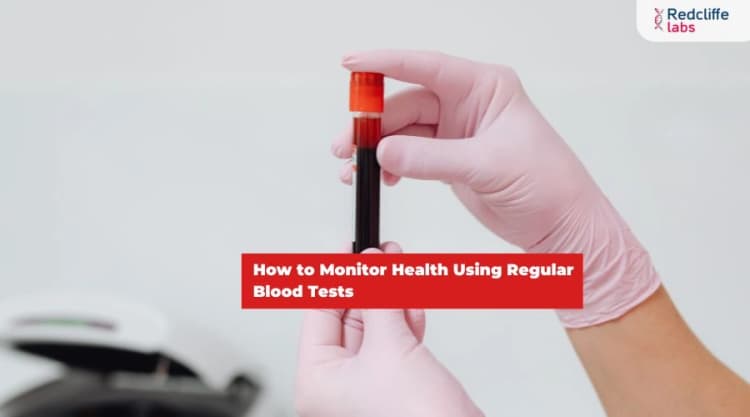The Carcinoembryonic Antigen (CEA) Test is a blood t...Read more
Blood
Unlock special
discount on
this package
Login to Unlock 🔓
NABL Accredited lab*

Booking Benefits Unlocked Worth FREE 799

Report Consultation

Diet Plan
*Available once your report is generated.
At Redcliffe Labs, we have a single goal: to give India its right to quality diagnostics.
Customers served
Tests Processed Everyday
Cities
Collection Centres
World Class In-house Labs
Home Collection Experts
1 Test Parameters
Carcinoembryonic Antigen (CEA) Test
1 PARAMETER INCLUDED
1 PARAMETER INCLUDED
- Carcinoembryonic Antigen (CEA) Test
Top Booked Health Checkup Packages
Reports in 12 hours
|Parameters 94
Reports in 12 hours
|Parameters 89
Reports in 12 hours
|Parameters 96
Reports in 12 hours
|Parameters 96
Reports in 12 hours
|Parameters 90
Helps you know your test better
Q. How can I book my test?
Q. In how much time will I get my test report?
Q. Where can I see or get my test results?
Q. Is home sample collection available for CEA blood tests?
Verified by Medical Expert

WRITTEN BY
Sheena Mehta

MEDICALLY REVIEWED BY
Dr. Pradeep Lodha
Table of Content
Introduction to Carcinoembryonic Antigen (CEA) Test
CEA stands for carcinoembryonic antigen. CEA is often used as a tumor marker in cancer diagnosis and monitoring. Tumor markers are substances produced by cancer cells or normal cells in response to cancer.
The CEA test helps in cancer diagnosis and management. The blood test measures carcinoembryonic antigen levels, a protein produced by some cancer cells and certain healthy tissues. The high CEA levels can raise the risk of cancer, particularly those affecting the digestive system, lungs, and breasts. CEA alone rarely presents with specific symptoms. However, doctors may recommend the test if you experience sudden weight loss, abdominal pain or bloating, changes in bowel habits, blood in stool, difficulty breathing, breast lumps, or discharge. Therefore, if your doctor recommends the CEA blood test, consider taking the test from Redcliffe Labs. The professional ensures to provide accurate test results on time.
Test details in brief
| Also Known As | Carcinoembryonic Antigen (CEA) Test, CEA Blood Test, Carcinoembryonic Antigen Assay, CEA Assay |
| Purpose | This measures CEA in the blood, detects cancer & checks if the ongoing treatment is working. |
| Preparation | Do not take any over-the-counter medicine without confirming with your doctor. |
| Fasting | No Fasting Required |
| Get Reports Within | Within 15 hours |
| Cost | INR 799 |
Purpose of the CEA Test
The Carcinoembryonic antigen blood test helps to measure the CEA level in the blood. The test serves the following purposes-
- Estimating cancer prognosis- The test is not used for initial cancer diagnosis; CEA levels help to identify stage-specific cancers, particularly colorectal cancer, by indicating the extent of tumor growth and spread.
- Treatment response- During cancer treatment, regular CEA tests can track its effectiveness. Low CEA levels mean a positive response, while high or rising CEA levels may suggest ineffective treatment or recurrence.
- Recurrence monitoring- After completing cancer treatment, periodic CEA blood tests help monitor for cancer recurrence. Rising levels could be an early warning sign that requires further investigation.
In addition to color or rectal cancer, the CEA test can help to assess the following types of cancers-
- Breast cancer
- Lung cancer
- Thyroid cancer
- Pancreatic cancer
- Head and neck cancer
What does the CEA Test detect?
The Carcinoembryonic antigen (CEA) is a glycoprotein, a protein combined with sugar molecules. During fetal development, CEA plays a role in cell growth and differentiation, particularly in the digestive system. Healthy adults have very low levels of CEA in their blood and other bodily fluids.
The Carcinoembryonic antigen test measures the concentration of CEA in these fluids, in blood, and sometimes cerebrospinal fluid (around the brain and spinal cord) or peritoneal fluid (lining the abdominal cavity).
Preparation for the CEA Test
Generally, the CEA test requires minimal preparation; here are some instructions to follow-
- Discuss with your doctor- Tell your doctor about medications that might affect your CEA levels.
- Smoking- Avoid smoking or drinking at least 24 hours before the test.
- Fasting- No fasting is necessary for the CEA test. You can eat and drink normally beforehand.
Don't hesitate to ask your phlebotomist any questions. The blood draw process is a simple and quick procedure. Relaxing your arm helps make it easier and minimizes discomfort.
The procedure of the CEA Test
During the CEA test, the lab technician will collect the blood sample from the vein of your arm.
A clean needle will be inserted into the vein. You may feel a brief pricking sensation during the procedure. The blood will be drawn into a small vial or tube. This process usually takes less than a minute. After the needle is removed, the puncture site will be covered with a bandage to stop any bleeding. You will be asked to apply gentle pressure to the area for a few minutes to prevent bruising. The blood sample will be labeled with your information and sent to a laboratory for analysis.
What do the CEA Test reports indicate?
The test reports will be available within 15 hours of sample collection. Consult your reports with your doctor; the healthcare provider may explain the implications, considering your medical history and other factors. Depending on the test reports, your doctor may recommend further testing, treatment, or regular monitoring of your CEA levels. CEA blood test reports indicate the level of carcinoembryonic antigen (CEA) present in your blood, spinal fluid, or peritoneal fluid. The results indicate-
Normal CEA levels- Healthy adults have low CEA levels in their blood; the normal CEA range is less than 0 to 2.5 ng/mL.
Elevated CEA levels- The high CEA levels indicate cancer. There are certain cancer types associated with high CEA levels-
- Colorectal cancer- This is the most common cancer associated with elevated CEA levels. Levels may be higher with larger tumors, advanced stages, or recurrence.
- Other cancers- High CEA can also be seen in lung, breast, stomach, pancreas, liver, and other cancers.
Non-cancerous Conditions-
- Gastrointestinal disorders- Ulcerative colitis, Crohn's disease, and other inflammatory bowel diseases can cause elevated CEA levels.
- Liver diseases- Cirrhosis, hepatitis, and other liver problems can also affect CEA levels.
- Smoker's lung- Smoking can cause CEA levels to be slightly elevated without indicating cancer.
- Other conditions- Pancreatitis, certain lung infections, and rare genetic disorders can also affect CEA levels.
Low CEA Levels- The low CEA levels indicate the effectiveness of the treatment. It means the tumor is small, and the cancer has not spread to other body parts.
What is the risk of a CEA blood test?
The CEA blood test has very minimal risks. Here are the potential risks and side effects to consider:
- Pain or discomfort during sample collection
- Slight bruising at the puncture site
- Minor bleeding may occur after needle removal
- Some people may experience lightheadedness or dizziness.
- Risk of infection
- Multiple puncture sites
- Allergic reactions in some people
Who should take the CEA Test?
Whether you should take the CEA blood test depends on several factors, including:
- People who have symptoms like abdominal pain, changes in bowel habits, rectal bleeding, sudden weight loss, chest pain, difficulty breathing, lump in the breast, change in breast size, or nipple discharge.
- Have Family history
- People who have a history of certain cancers
What are the common symptoms related to abnormal CEA levels?
The abnormal CEA levels don't cause specific symptoms. However, here are some possible symptoms linked to common situations-
Type of Cancers
- Colorectal cancer- Abdominal pain, changes in bowel habits (diarrhea, constipation, blood in stool), unexplained weight loss, fatigue.
- Lung cancer- Persistent cough, difficulty breathing, chest pain, coughing up blood, weight loss.
- Breast cancer- Lump in the breast, changes in breast shape or size, nipple discharge.
- Other cancers- Symptoms may include persistent pain, fatigue, weight loss, appetite changes, nausea, vomiting, and bleeding.
Non-cancerous conditions:
- Inflammatory bowel disease (Crohn's disease, ulcerative colitis): Abdominal pain, diarrhea, rectal bleeding, fever, fatigue.
- Liver diseases (cirrhosis, hepatitis)- Fatigue, nausea, vomiting, jaundice, abdominal pain, swelling of legs or ankles.
- Smoker's lung- Cough, shortness of breath, wheezing, chest tightness.
The presence of these symptoms doesn't necessarily mean cancer. Get a Carcinoembryonic antigen blood test to measure the CEA levels and confirm the condition for proper evaluation and diagnosis.
CEA Test price at Redcliffe Labs
The CEA test cost is INR 799 at Redcliffe Labs. You can book your test with the Redcliffe Labs app or call us to book an appointment online. Our labs are NABL-accredited and ISO-certified and adhere to international quality standards for testing accuracy and reliability. We also provide home sample collection services. You can choose us as your trusted diagnostic partner to avail a wide range of tests at affordable prices and the best discounts. Book your CEA test with us today!

Other Cancer Screening Tests/Packages That You Can Book with Redcliffe Labs
- HCG Tumor Marker (Cancer) Test
- Breast Cancer Test - Essential
- Cancer Screening Package Essential - Male
- Cancer Screening Package Advance - Female
- Cancer Screening Package Advance - Male
The CEA Test: Navigating Cancer and Beyond
For those diagnosed with cancer, the CEA test is very helpful to monitor the effectiveness of treatment and detect early signs of recurrence in the fight against the disease. CEA is a protein found in low levels in healthy adults and can rise in response to various conditions, including cancer like colorectal, lung, breast, stomach, pancreas, liver, and others. However, the people who are noticing persistent abnormal symptoms like abdominal pain, changes in bowel habits, persistent cough, and breast lumps must get the CEA test from nearby Redcliffe Labs. Always consult your doctor to determine if the CEA test is right for you and interpret the results properly. The detection and intervention are crucial for managing various health conditions, including cancer. You're not alone in this journey. Reach out to your doctor, learn about the CEA test, and together, navigate towards a healthier tomorrow.
5 Simple Steps to Manage Your Health with Redcliffe Labs
Quick, Simple & Convenient; trusted care delivered to your doorstep.

Start Your Online Booking
Open the Redcliffe Labs website/app. Select the test or package and enter your details. Schedule the service for your preferred slot.

Live Tracking
Stay updated with real-time tracking for a smooth and timely home sample collection.

Sample Collection
Our certified experts ensure a smooth, hygienic, and fully compliant sample collection experience.

Doctor-Verified Smart Reports
Every report is clinically checked by expert doctors and shared with smart, actionable insights.

Your Health Journey Continues Post Reports
Consult with our expert medical team to get actionable insights to improve your health.
Nearby Labs(9)
Redcliffe Labs Noida

MC-5280
Redcliffe Collection Center
Redcliffe Collection Center
Redcliffe Collection Center
Redcliffe Collection Center
Redcliffe Collection Center
Redcliffe Collection Center
Redcliffe Collection Center
Redcliffe Collection Center
Frequently Asked Questions
What does the CEA test measure?
Why is the CEA test done?
What is the CEA test price?
How is the CEA test performed?
What should I do if my CEA test results are elevated?
What level of CEA indicates cancer?
What happens if CEA is high?
Can CEA detect colorectal cancer?
Is a CEA test accurate?
Can stress raise CEA levels?
Can fatty liver increase CEA?
What cancers are high in CEA?
Can CEA detect early cancer?
Can CEA be high without cancer?
Can I book a Carcinoembryonic Antigen (CEA) Test near me?
Can I book a home collection for a Carcinoembryonic Antigen (CEA) Test?
Health Articles & Blogs
My Health
Stay informed with our expert health articles and blogs. Explore comprehensive guides on diseases, nutrition, preventive care, and wellness tips to help you make better health decisions.
Capsicum (Shimla Mirch) 101: Benefits, Nutritional Value, Uses and More

Normal Calcium Levels: Range, Symptoms & Causes of Imbalance

Home Remedies to Get Rid of Cold in Babies: Safe & Natural Relief for Infants
Discover safe home remedies to get rid of cold in babies. Learn natural and gentle relief methods to ease cough, congestion, and cold symptoms in infants.

How Often Should You Get a Full Body Health Checkup?

Understanding BUN Test Normal Range & Results: High, Low & Normal
Understanding BUN test normal range and results helps evaluate kidney health. Learn what high, low, and normal BUN levels mean and when to get tested.

What Level of Lymphocytes Is Dangerous?

How to Monitor Health Using Regular Blood Tests?

টাইফয়েড কি বাহিত রোগ? – জানুন সবকিছু
Explore My Health
